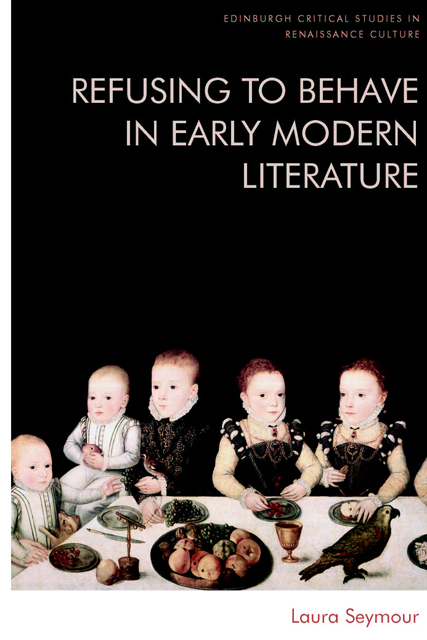Book contents
- Frontmatter
- Contents
- Acknowledgements
- Series Editor’s Preface
- Introduction: The Body at Play in Early Modern Texts
- 1 Ungracious Grace: Proprioception and Staging Taste in Thomas Dekker’s If This Be Not a Good Play, the Devil Is in It (1611)
- 2 Walking Without God – (Mis)Learning Through the Gait in Mateo Alemán’s Guzmán de Alfarache (1599 and 1604) and James Mabbe’s The Rogue (1622)
- 3 Plain Plasticity – Thomas Ellwood’s The History of the Life of Thomas Ellwood (1714)
- 4 Chaste and Silent – Again. Vitality and the Bound and Loosed Body in I.T.’s Grim the Collier of Croydon; or, The Devil and His Dame (c. 1600)
- Index
4 - Chaste and Silent – Again. Vitality and the Bound and Loosed Body in I.T.’s Grim the Collier of Croydon; or, The Devil and His Dame (c. 1600)
Published online by Cambridge University Press: 25 April 2023
- Frontmatter
- Contents
- Acknowledgements
- Series Editor’s Preface
- Introduction: The Body at Play in Early Modern Texts
- 1 Ungracious Grace: Proprioception and Staging Taste in Thomas Dekker’s If This Be Not a Good Play, the Devil Is in It (1611)
- 2 Walking Without God – (Mis)Learning Through the Gait in Mateo Alemán’s Guzmán de Alfarache (1599 and 1604) and James Mabbe’s The Rogue (1622)
- 3 Plain Plasticity – Thomas Ellwood’s The History of the Life of Thomas Ellwood (1714)
- 4 Chaste and Silent – Again. Vitality and the Bound and Loosed Body in I.T.’s Grim the Collier of Croydon; or, The Devil and His Dame (c. 1600)
- Index
Summary
When we first meet her, as a marriageable young woman, it seems that Honorea has never spoken. Honorea’s father Morgan, Earl of London, and his friend Lord Lacy of Kent read her silence as a sign of chastity and modesty, assuming that she would therefore make the perfect wife. In fact, as I explore in this chapter, Honorea’s initial silence and outwardly docile behaviour barely conceal a simmering, subversive vitality, difficult to bind once set loose. Honorea is the central character in the probably-late-Elizabethan drama Grim the Collier of Croydon; or, the Devil and his Dame, attributed to ‘I. T.’, whose identity is uncertain. The plot centres around Morgan offering Honorea’s hand in marriage to whichever man can make her speak; his plan is to marry her to the ageing Lacy. Honorea, however, is in love with a man called Musgrave, who reciprocates her love. A character called Castiliano enters, informing everyone that he is a Spanish doctor and promising to cure Honorea with a potion of magic herbs. Administering the potion, Castiliano loads the encounter with high expectations of hearing Honorea’s ‘Celestial voice’, and though twice offering Honorea ‘freedom’ he caps it each time with the admonition that she will choose him as her husband. When Honorea does speak, it is with a torrent of abuse, angrily rejecting both Lacy and Castiliano, berating her father and thoroughly puncturing the men’s expectation that her silence was the precursor to chaste, obedient speech:
Honorea matches her volubility with angry bodily movement: she exits ‘in a chafe’ or temper. Chafing was associated with vitality, physical heat, excitement, and aliveness; ‘to chafe’ could mean to heat the body and inflame the feelings (often in vexation). Her outburst begins with crude xenophobia, classism, and ageism, and ends making a fair point: her father should not have chosen her a husband against her will. Robin Goodfellow bluntly signals the comedic import of the potion scene. His obvious remark attempts to contain what no doubt exceeded his neat couplet: Honorea’s body brimming with rage, turning the tables on the male characters who had talked over her throughout the first three scenes of the play.
- Type
- Chapter
- Information
- Refusing to Behave in Early Modern Literature , pp. 81 - 108Publisher: Edinburgh University PressPrint publication year: 2022



